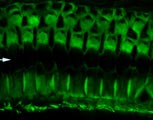Discovery of a deafness-causing gene defect in mice has helped identify a new protein that protects sensory cells in the ear, according to a study led by University of Iowa researchers. The findings, which also involved Kansas State University, appear in the Aug. 21 issue of the open-access journal PLoS Genetics. 
When claudin-9 is mutated, potassium floods the wrong part of the ear's sensory cells, killing a layer of them, as indicated by the arrow in this image. Credit: University of Iowa
In humans, hereditary deafness is one of the most common birth defects, yet most genes involved in hearing are unidentified. Mice are used as research models because mouse and human auditory genetics are very similar.
Using a deaf mouse model generated at The Jackson Laboratory, the team identified the deafness-causing defect in the claudin-9 gene. The mutated gene fails to produce normal claudin-9 protein, which, the UI team showed, is needed to maintain the proper distribution of potassium in the inner ear.
"Genes in the claudin family number at least 24 and produce proteins that prevent ions, including potassium, from moving between cells," said the paper's senior author Botond Banfi, M.D., Ph.D., assistant professor of anatomy and cell biologyin the UI Roy J. and Lucille A. Carver College of Medicine. "Sensory cells in the hearing organ are bathed in a high potassium solution on one side and in a low potassium solution on the other side. We found that claudin-9 is very important in keeping the amount of potassium on the two sides separate. This separation protects sensory cells from potassium intoxication."
When claudin-9 is mutated, potassium floods the wrong part of the sensory cells, killing most and leaving the remaining ones functionally defective.
In follow-up efforts, Banfi and colleagues, including the study's first author Yoko Nakano, Ph.D., UI assistant research scientist in anatomy and cell biology, are screening people with hearing impairment to see if some of them have a mutation in claudin-9.
The study was funded in part by a grant from the National Institutes of Health and support from the UI Carver College of Medicine and the UI Gene Therapy Center.
Taken from news-releases.uiowa.edu/.
Gene Discovery Reveals a Critical Protein's Function in Hearing
Share:

